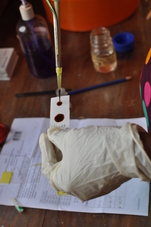World AIDS Day 2013: What happens if we take HIV and malaria drugs at the same time?
29 November 2013

Several African countries are heavily affected by both HIV/AIDS and malaria. The ACT Consortium is investigating how antimalarial and antiretroviral drugs interact when taken simultaneously.
In many malaria-endemic countries HIV/AIDS continues to spread, therefore an increasing number of patients need treatment for both infections at the same time.
The World Health Organization (WHO) and ministries of health in most endemic countries recommend the use of artemisinin-based combination therapy (ACT) for malaria and antiretroviral combination treatments (ART) for HIV/AIDS.
There is cause for concern as some of these drugs share important elements, which can lead to drug interactions in the human body that could mean unwanted side effects and ultimately affect their efficacy against either of the diseases.
A team of ACT Consortium researchers led by Dr Lasse Vestergaard conducted the InterACT trial to assess the safety, efficacy and chemical interactions between the currently recommended treatment for malaria and some widely used antiretroviral drugs in Tanzania.
The forthcoming results are anticipated to inform the third edition of the WHO malaria treatment guidelines. There is currently very little clinical and pharmacological information available to guide clinicians and policy-makers on the use of drugs for malaria and HIV simultaneously.
What HIV infected people think of taking malaria treatment
Parallel research has shown that HIV-positive people saw malaria as potentially more harmful to them due to their HIV status. However, this did not seem to improve their preventive behaviour, as getting malaria was often seen as ‘unavoidable’.
Health workers’ advice may play an important role in encouraging patients to take both malaria and HIV treatment, the study also suggested. Overall, patients felt that taking antimalarials and antiretrovirals at the same time was unproblematic, but some thought the combined treatment was too strong and took the different drugs at different times to avoid any perceived harm to the body.
The research team says further support is needed to help HIV-positive people manage the perceived risks around contracting malaria and encourage them to prevent it. Managing cases of co-infection may also be improved if health workers communicate better with patients about the instructions to take treatment in the context of their daily lives.
What is the appropriate dosage of ACT drugs in patients who are taking HIV medication?
The interactions that can happen in the body between HIV and malaria drugs are potentially clinically significant, but this has not been well defined in people living with HIV.
Professor Karen Barnes from the University of Cape Town, in South Africa, is conducting the ACT Consortium’s SEACAT project to understand what appropriate dosage of ACT drugs is needed to treat malaria in patients who are already taking HIV medication.
The team is also assessing the safety of drugs to identify any potential harms of these combinations.
- To receive updates on our research results, subscribe to our newsletter
- Watch videos about the InterACT and SEACAT studies
- Learn more about HIV/AIDS research at the London School of Hygiene & Tropical Medicine

